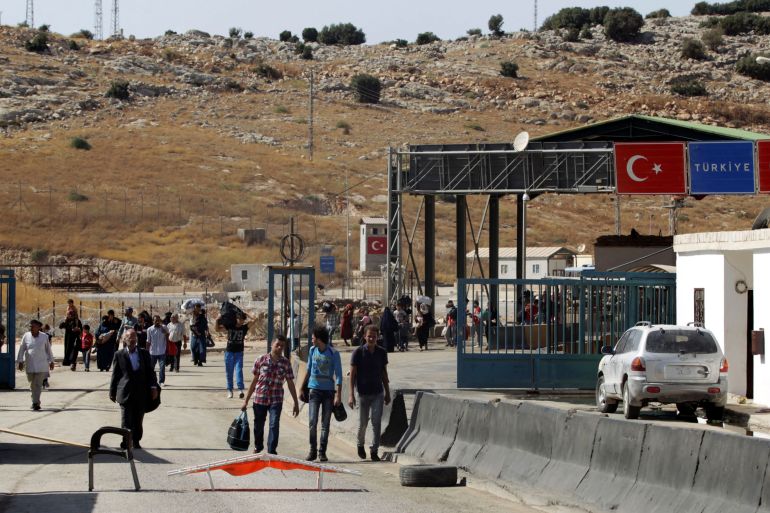Abuses of returning Syrian refugees ‘still running’: HRW
Rights group calls for a halt of all returns of Syrians and urges countries hosting refugees to take this position.

Beirut, Lebanon – Continuing Syrian government human rights abuses mean refugees should not be returned, Human Rights Watch (HRW) says, urging host nations to immediately halt all refugee returns.
The New York-based organisation said in a new report on Wednesday that it had documented extrajudicial killings, torture, kidnappings, and sexual violence perpetrated against returned Syrian refugees, many of whom had security clearances from the government before returning.
Keep reading
list of 4 itemsSyrian army shelling kills at least 11 people in Idlib’s Ariha
Bomb attack in Damascus kills 14 Syrian military personnel
Shooting in Syria could mark new phase in Israeli campaign
“The fact that the armed conflict diminished in large parts of the country is beside the point,” HRW’s Executive Director Ken Roth said at the report’s launch.
“The main targeted threat to returning refugees remains fully operational and is running at full speed. The multiple agencies that prey on Syrians are still running.”
“The government continues to commit human rights abuses against Syrians, and so long as this continues, any talk of returns would be premature,” HRW’s Syria researcher Sara Kayyali said on Wednesday.
According to the UN, there are more than 851,000 Syrian refugees in Lebanon and about 670,000 in Jordan.
‘Burns on his body’
In the report – Our Lives Are Like Death: Syrian Refugee Returns from Lebanon and Jordan – the rights group interviewed 65 Syrian refugees who returned from Lebanon and Jordan between 2017 and 2021 or their family members.
In September 2020, 39-year-old Abdul from Deraa returned home from Jordan’s Ramtha, wanting to reclaim his lands and see his family after he heard the war was over.
He told HRW that, a month later, he was on his way to visit the capital when he was arrested at a checkpoint and taken to military intelligence detention centres, first in Sweida and then in Damascus, where he was tortured and deprived of sufficient food and water.
He was accused of “financing terrorism” and detained for four months.
Mona, 25, from Sayida Zeinab in Damascus, returned from Lebanon to Syria in 2018 with her husband after her daughter was diagnosed with cancer and they could not afford treatment there. Her husband had deserted the Syrian army in 2015.
“Somebody must have told the army that we were back,” Mona told HRW, saying her husband was arrested and jailed for nine months.
“There were lots of marks on his body, red and blue … He also had burns on his body. It is all because he deserted the army previously.”
The refugees HRW interviewed said they wanted to return because of a lack of job opportunities and access to healthcare in their host countries, because they wanted to reclaim their homes and property, and because they believed it was safe.
Syrian refugees have been affected severely by Lebanon’s economic crisis, with the UN saying about 90 percent live in extreme poverty. About 575,000 have returned during the past four years, HRW reported.
The security concerns compound other woes for war-torn Syria.
“Widespread property rights violations and other economic hardships also make a sustainable return impossible for many,” Nadia Hardman, HRW’s refugee and migrant rights researcher, said.
The devaluation of the Syrian pound and price rises have plunged millions into poverty.
‘Ensure their security’
The UN estimates that 13 million Syrians across the country need humanitarian aid, while hundreds of thousands across the country’s north are plagued by a crippling water crisis.
In a two-day visit to Syria last week, UN High Commissioner for Refugees Filippo Grandi discussed with Foreign Minister Faisal Mekdad and other officials the importance of addressing the treatment of refugees upon their return.
“These are Syrian nationals and it’s the government’s responsibility to ensure their security,” said Grandi, calling on the international community to increase funding to secure access to water, healthcare, and education and fix damaged homes.
“We are engaging with the government to highlight refugees’ concerns such as their safety, property rights and livelihoods.”
The Syrian government in Damascus and key ally Russia have urged refugee returns to government-held areas in the country. In late 2020, Damascus hosted a refugee returns conference, which Lebanon and Jordan attended.
Syria’s war has killed about 500,000 people during the past 10 years. It started with a brutal crackdown on anti-government protests, later turning into a complex battlefield involving international armies, local militias, and foreign fighters.